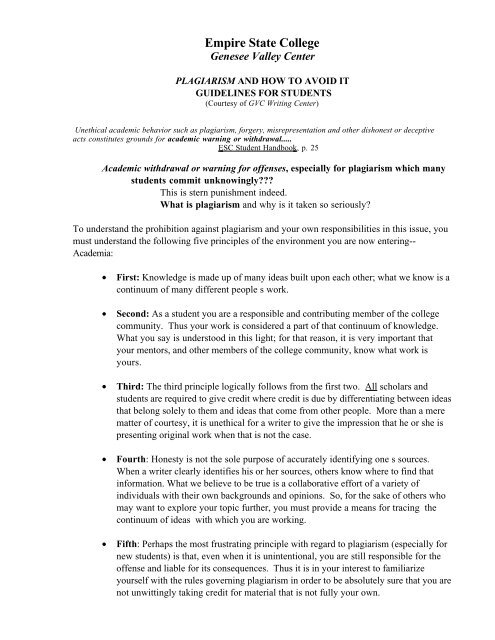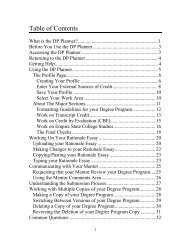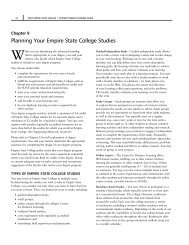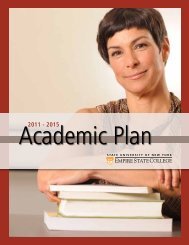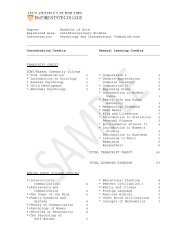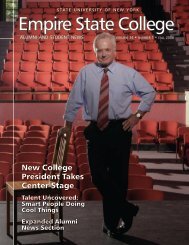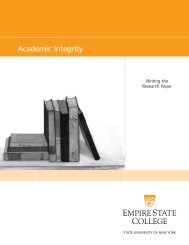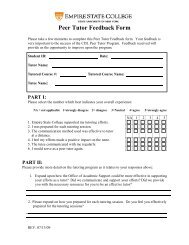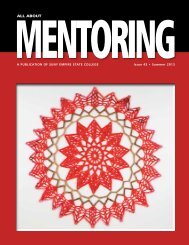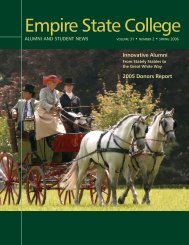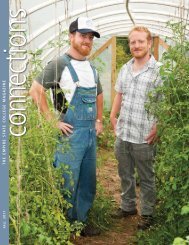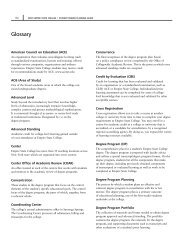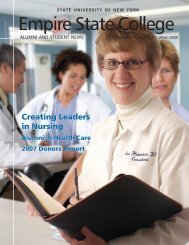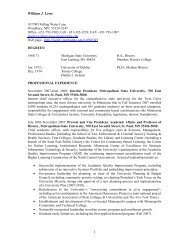SUNY Empire State College
SUNY Empire State College
SUNY Empire State College
You also want an ePaper? Increase the reach of your titles
YUMPU automatically turns print PDFs into web optimized ePapers that Google loves.
<strong>Empire</strong> <strong>State</strong> <strong>College</strong><br />
Genesee Valley Center<br />
PLAGIARISM AND HOW TO AVOID IT<br />
GUIDELINES FOR STUDENTS<br />
(Courtesy of GVC Writing Center)<br />
Unethical academic behavior such as plagiarism, forgery, misrepresentation and other dishonest or deceptive<br />
acts constitutes grounds for academic warning or withdrawal.....<br />
ESC Student Handbook, p. 25<br />
Academic withdrawal or warning for offenses, especially for plagiarism which many<br />
students commit unknowingly<br />
This is stern punishment indeed.<br />
What is plagiarism and why is it taken so seriously<br />
To understand the prohibition against plagiarism and your own responsibilities in this issue, you<br />
must understand the following five principles of the environment you are now entering--<br />
Academia:<br />
• First: Knowledge is made up of many ideas built upon each other; what we know is a<br />
continuum of many different people s work.<br />
• Second: As a student you are a responsible and contributing member of the college<br />
community. Thus your work is considered a part of that continuum of knowledge.<br />
What you say is understood in this light; for that reason, it is very important that<br />
your mentors, and other members of the college community, know what work is<br />
yours.<br />
• Third: The third principle logically follows from the first two. All scholars and<br />
students are required to give credit where credit is due by differentiating between ideas<br />
that belong solely to them and ideas that come from other people. More than a mere<br />
matter of courtesy, it is unethical for a writer to give the impression that he or she is<br />
presenting original work when that is not the case.<br />
• Fourth: Honesty is not the sole purpose of accurately identifying one s sources.<br />
When a writer clearly identifies his or her sources, others know where to find that<br />
information. What we believe to be true is a collaborative effort of a variety of<br />
individuals with their own backgrounds and opinions. So, for the sake of others who<br />
may want to explore your topic further, you must provide a means for tracing the<br />
continuum of ideas with which you are working.<br />
• Fifth: Perhaps the most frustrating principle with regard to plagiarism (especially for<br />
new students) is that, even when it is unintentional, you are still responsible for the<br />
offense and liable for its consequences. Thus it is in your interest to familiarize<br />
yourself with the rules governing plagiarism in order to be absolutely sure that you are<br />
not unwittingly taking credit for material that is not fully your own.
Easier said than done!!! What if you re writing a paper on family issues in the<br />
workplace, and you re not certain if what you have to say is original Everything you d<br />
like to say seems to have already been said by one of the authors you have read. Here are<br />
a few tips:<br />
• To avoid passing off the author s viewpoint as your own, or to let it stand as a substitute for<br />
your own, you must first acknowledge the author, then go on to say why you think this<br />
viewpoint is or is not valid. In doing so, you have not only appropriately cited your source,<br />
but you have drawn a conclusion about the validity of that source and thereby made an<br />
original contribution to our understanding of your topic.<br />
• Being able to paraphrase, or summarize, an author s viewpoint without resorting to direct<br />
quotations is valued. It shows that you ve read, and understood, what the author has said so<br />
well that you can use your own words to describe that viewpoint. Remember, even though<br />
in paraphrasing, the words are yours, the idea belongs to someone else who must be<br />
given credit; failing to do so is plagiarism.<br />
• Direct copying of words or phrases without using quotation marks--even if the source is<br />
cited--is plagiarism too. Not only does this mislead your reader into thinking you wrote<br />
words you didn t write, it gives the false impression that you understood the author s ideas<br />
well enough to paraphrase them. Whenever you lift words verbatim from a text, they must<br />
be enclosed within quotation marks.<br />
• Some words and facts don t need to be cited because they are considered knowledge that is a<br />
part of the public domain or common knowledge. We all agree, for example, that<br />
Christopher Columbus landed in the Americas in 1492 (though we may differ as to whether<br />
or not we should celebrate that event), that the boiling point of water is 100 degrees<br />
Centigrade (though different experiments will use this fact to different ends) and that Mark<br />
Twain wrote Huckleberry Finn (though we may argue about the novel s racial politics).<br />
These facts will appear in sources, and can appear in your papers, without a citation because<br />
they ve been established by many different authorities. An author s unique interpretation of<br />
these facts, however, requires a citation. If you are in doubt about whether a certain piece of<br />
information is common knowledge or interpretation, it is a good rule of thumb to cite it.<br />
The format for citing authors will vary, depending on whether your area of study is in the<br />
humanities or sciences, but the need to avoid plagiarism by adequately documenting the<br />
source of your information remains the same. For further information on the different<br />
citation styles (whether it be APA, MLA or the Chicago Style Manual), speak to your<br />
mentor or contact the ESC Writing Center.<br />
Concerns about plagiarism can be overwhelming, partly because it s taken so seriously and<br />
partly because it s not always easy to know whether or not you have unintentionally plagiarized.<br />
If the rules governing plagiarism still seem fuzzy, speak to a Writing Center tutor. They can help<br />
clarify what to many new students is a confusing and somewhat nerve-wracking issue.


